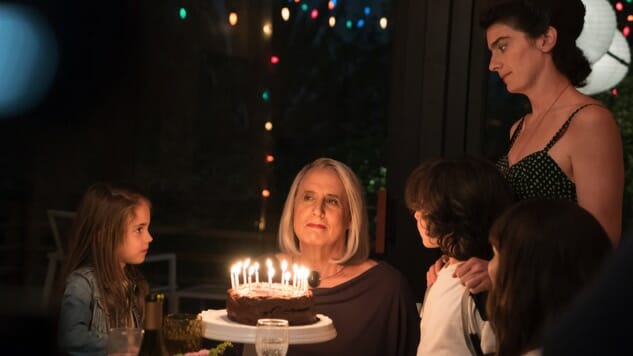In Transparent, Family Itself Is Home, Even as Its Architecture Changes

This review contains spoilers from episodes three and four of Transparent, Season Three.
Maura Pfefferman celebrates her 70th birthday in the house where she spent her life, but the days when she might have called it “home” seem so long ago now, mere clippings in a family album. “To Sardines and Back” bears the marks of these memories, faint fingerprints at the corners of each page: the rearrangement of the living room, the height of the ceilings, the turtle inside the walls. Upon reflection, the strange Nacho conceit that opens the episode—the Pfeffermans’ lost pet plodding along in the ducts over the course of two decades, growing as Sarah (smoking pot), Josh (having sex), and Ali (singing songs) do—is of a piece with Maura’s wonder at the shape of change, her life’s halting evolution. If “To Sardines and Back” and “Just the Facts” are no match for “Elizah,” the third and fourth episodes of Transparent’s third season nonetheless soar on these strands of affection, forms of kinship that feel permanent even as the past starts to fade. “Who the fuck are you?” Vicki asks, admiring Maura’s sleek silver bob in the hairdresser’s mirror, and the struggle to find an adequate answer to that question runs through the two episodes like a fugue.
Against the more eccentric tenor of Ali’s nitrous-induced visions, or Sarah’s reaction to the temple board’s vote—“Resting Bitch Face says that I have dark energy,” she mutters—it’s in the gentle prickle of the climactic gathering that “To Sardines and Back” takes shape. Transparent, with its sprawling, Altmanesque streak—the wedding of the second season premiere, for instance—is rather brilliant when it comes to the distinct rhythms of family life; the laugh the Pfefferman siblings share after everyone’s left the table sent me into nostalgic reveries, as if I’d paged through a few album clippings of my own. Part of the series’ skill is to recognize that humor is its own form of friction, as when Shelley announces her own “transition,” from mother and ex-wife to “brand.” It is, as Judith Light delivers it, pure farce, but director Jill Soloway, cutting to Maura and Vicki’s stony expressions, also suggests its crueler complexion, its false equivalence of experiences. (That said, the close resemblance between Maura’s new haircut and Shelley’s totally slayed me.)
The result, as Maura lays out her plans, is a subtle shiver of tension, like the brief hiss of sparklers on a midsummer night: Soloway allows Shel her own hurt feelings, hearing her ex- usurp “Mom,” and considers the children’s mixture of support and surprise at Maura’s intention to begin her medical transition, memorably distilled in the phrase “Dad’s pussy.” Transparent is full of such intimate moments, stretches in which the Pfeffermans are so believably a “not-chosen family”—with all the history, or baggage, that entails—that I sometimes forget they’re fictional characters. The morning greeting between Ali and Josh in “Just the Facts,” as he brings her orange juice in bed and they discuss planting tomatoes and basil, is so easy, so unmannered, that Leslie watches in awe—as amazed, in a sense, as we are. The Pfeffermans are fucked up, don’t get me wrong, but compare the occasional bristle of their interactions with the episode’s strained sexual relationships: Ali asking Leslie not to “do a post-game” on their fucking; Sarah lashing out at her dominatrix after a spinning class with Len’s lithe, 22-year-old girlfriend; Josh’s fraught involvement with Rita, who concludes “Just the Facts” by taking her own life. In Transparent, family itself is “home,” even as its architecture changes.
The gentle prickle of Maura’s celebration, then, strikes me as an analogue to David’s description of the divine presence: “A tingle on the back of the neck.” Raquel’s fear that the presence is absent, after the miscarriage that shattered her family before it began, underlines in her sorrow the strength of the “not-chosen” connection, the inexplicable weight of those we’re stuck with, and come to depend on, despite the devilish passage of time. I suppose this is the purpose of the Nacho conceit, and the Pfeffermans’ marvel at finding what once seemed lost, to leaven the perception of ceaseless change with a reminder of what remains constant. Maura, Moppa, Mom: She grows, as we all do, adds pages to her album, but she’s still the same person that once brought home a turtle, still part of her “tribe,” or her “swarm.”